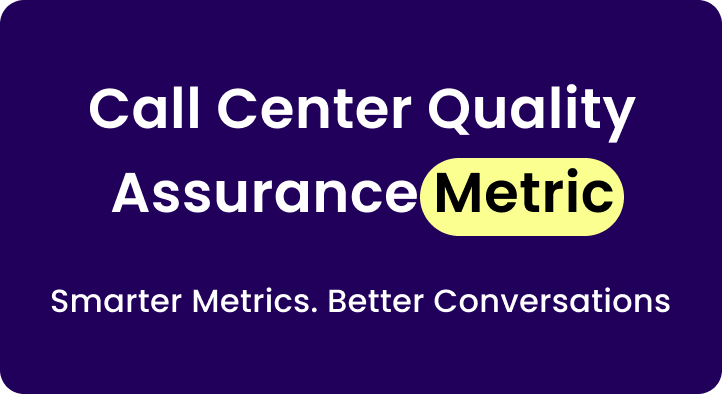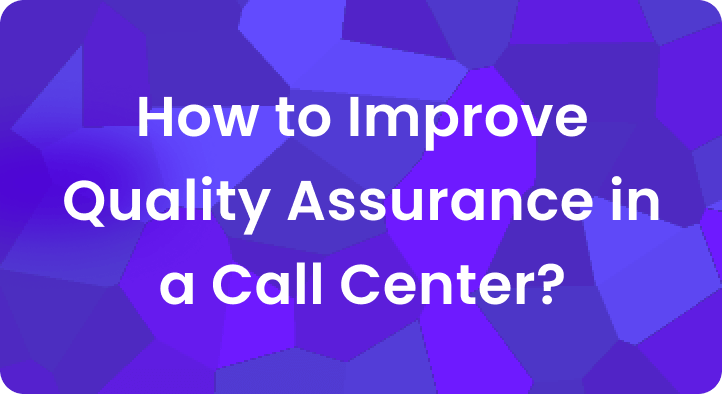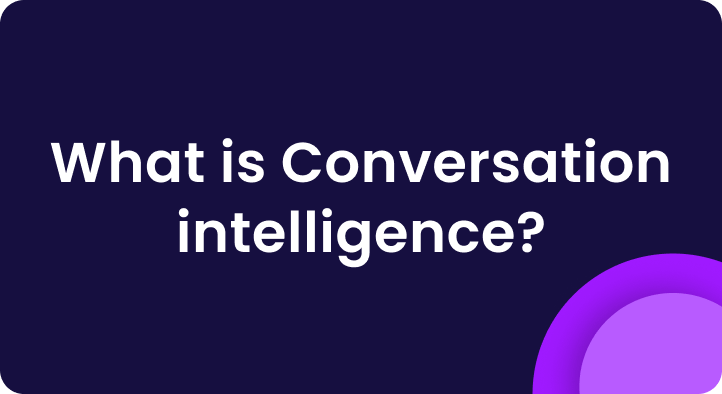Call center agents are at the heart of every customer experience. But managing performance at scale? That’s where things get tricky.
According to a McKinsey study, companies that use data-driven performance management see 30% higher agent productivity and more consistent customer satisfaction scores.
The catch? You need the right tools – and that’s where an agent scorecard comes in.
A well-built scorecard gives you more than just numbers.
It shows you who’s thriving, who needs coaching, and where your team can improve.
When used right, it becomes a roadmap – not just for tracking metrics, but for building a stronger, more accountable contact center.
In this article, we’ll break down what goes into an effective agent scorecard, what metrics actually matter, and how to avoid the common pitfalls that derail performance.
Upload Call & Get Insights
 DOWNLOAD DUMMY FILE
DOWNLOAD DUMMY FILE Table of Contents
A. What is a call center agent scorecard?
A call center agent scorecard is a structured way to measure how well agents perform.
It tracks key metrics like call quality, customer satisfaction, and productivity – all in one place.
Think of it like a report card. It shows you what an agent is doing well and where they need help.
The goal isn’t just to monitor, but to coach, guide, and improve.
Most scorecards combine both quantitative metrics (like AHT or FCR) and qualitative factors (like tone, empathy, and compliance).
The best ones tie directly to your business goals – whether that’s faster resolutions, higher CSAT, or better upsells.
Done right, a scorecard:
- Sets clear expectations
- Brings objectivity to evaluations
- Keeps agents and managers aligned
In short, it’s one of the most powerful tools for driving performance – if you use it consistently and fairly.
B. Main agent and quality metrics to track
The best scorecards aren’t crammed with every possible metric – just the ones that actually drive better performance and customer outcomes.
As a manager, you’re likely juggling two main buckets: agent productivity and call quality. Let’s break down what matters in each.
a. Agent performance metrics
These tell you how efficiently an agent is handling their workload:
1. Average handle time (AHT)
Measures how long agents spend per call, including talk time and hold time. Lower isn’t always better – a rushed call can hurt quality. But tracking trends helps spot coaching needs.
2. After-call work (ACW)
How much time do agents take to wrap up notes or complete tasks after a call. High ACW may mean poor workflows or a lack of tools.
3. Schedule adherence
Tracks whether agents are available when they’re supposed to be. Even top performers hurt the team if they’re frequently late or offline.
4. Call volume
Simply put: how many calls an agent handles in a shift. Useful for spotting outliers or identifying who’s overloaded.
According to Call Centre Helper, 62% of managers say AHT is their most-used metric, but only 34% believe it truly reflects performance. That’s a strong case for balancing speed with quality.
b. Quality and customer experience metrics
These show how well your agents are representing your brand on every call:
1. Quality assurance (QA) score
Based on call audits using scorecards or rubrics. Usually covers tone, accuracy, soft skills, and script compliance.
2. First call resolution (FCR)
Tracks how often an issue is resolved in one call. High FCR means fewer follow-ups, lower costs, and happier customers.
3. Customer satisfaction (CSAT)
Typically gathered from post-call surveys. Gives direct insight into how the customer felt about the interaction.
4. Compliance score
Especially critical in regulated industries. Tracks whether agents followed necessary disclosures, legal steps, or process rules.
Salesforce found that 89% of customers are more likely to make another purchase after a positive service experience. That’s why measuring quality is just as vital as measuring speed.
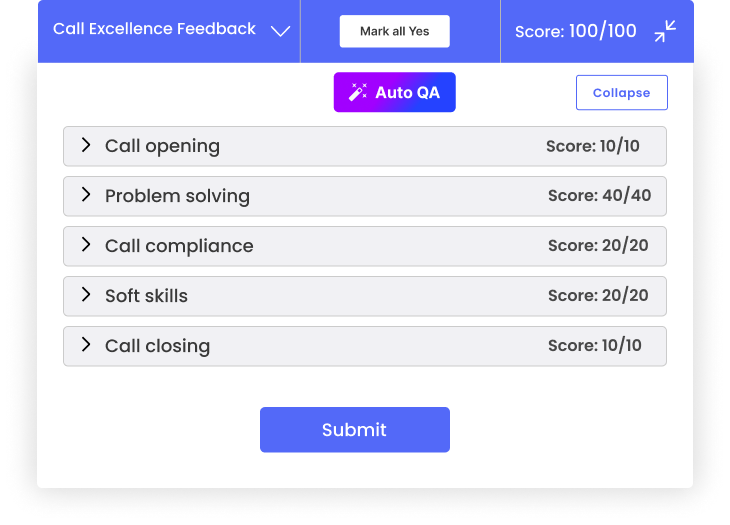
C. How to customize scorecards for different roles?
Not every agent does the same job, so why should they all be measured the same way?
A one-size-fits-all scorecard might seem easy, but it often misses the mark. To drive real improvement, your scorecard should reflect the specific goals and responsibilities of each role.
Here’s how to tailor it:
1. Inbound support agents
These agents handle a high volume of customer queries, often under pressure. For them, focus on:
- First Call Resolution (FCR)
- Empathy and soft skills
- Adherence to schedule
- QA score
They need to be efficient but also calm and reassuring. A low CSAT here could signal a training gap or poor call handling, not just slow response time.
2. Outbound sales or collections agents
These agents are more results-driven. Your scorecard should reflect that:
- Conversion or commitment rate
- Script compliance
- Objection handling
- Talk time (longer isn’t always bad here)
Outbound roles are less about volume, more about persuasion and persistence. Give more weight to quality and outcomes, not speed.
3. Blended agents (support + sales)
These folks need a balanced scorecard that captures both sides:
- CSAT + conversion rate
- FCR
- QA score
- Upsell/cross-sell attempts
Keep the scoring flexible; you may want to weigh different metrics based on shift type or call type.
4. Tier 2 or technical support
These agents go deep. Their calls may be long, but their goal is accuracy and resolution:
- Technical accuracy
- FCR
- QA score with extra points for troubleshooting steps
- ACW time (to ensure documentation is thorough)
Don’t penalize them for long handle times — that’s part of the job. Focus instead on whether the issue stays solved.
Sample agent scorecards by role
| Metric | Inbound Support | Outbound Sales | Blended Agent | Tier 2 Support |
| CSAT (Customer Satisfaction) | ✅ High priority | ⚪ Optional | ✅ High priority | ✅ High priority |
| FCR (First Call Resolution) | ✅ High priority | ⚪ Low relevance | ✅ High priority | ✅ Critical |
| QA Score | ✅ High priority | ✅ High priority | ✅ High priority | ✅ High priority |
| Average Handle Time (AHT) | ✅ Medium priority | ⚪ Low relevance | ✅ Medium priority | ⚪ Not weighted |
| Call Volume | ✅ Medium priority | ⚪ Low priority | ✅ Medium priority | ⚪ Not applicable |
| Conversion Rate | ⚪ Not applicable | ✅ Critical | ✅ Medium priority | ⚪ Not applicable |
| Script Compliance | ✅ Medium priority | ✅ Critical | ✅ Medium priority | ⚪ Optional |
| Empathy / Soft Skills | ✅ Medium priority | ✅ Medium priority | ✅ Medium priority | ⚪ Optional |
| Adherence to Schedule | ✅ High priority | ✅ High priority | ✅ High priority | ✅ Medium priority |
| Technical Accuracy | ⚪ Not applicable | ⚪ Not applicable | ⚪ Optional | ✅ Critical |
| After-Call Work (ACW) | ✅ Medium priority | ⚪ Optional | ✅ Medium priority | ✅ Medium priority |
D. 5 benefits of using an agent scorecard
Call centers run on people, and people perform better when they know where they stand.
That’s exactly what an agent scorecard delivers. It turns daily performance into something visible, trackable, and coachable. When used consistently, it can transform how your team performs, learns, and grows.
Let’s break down the benefits:
1. Sets clear expectations from day one
A scorecard gives agents a crystal-clear view of what’s expected.
There’s no guesswork about what managers are looking for. Every metric from CSAT to AHT is defined, measured, and weighted.
Why it matters:
When expectations are vague, performance becomes inconsistent. But when you define success in numbers, agents can focus their energy on hitting the right targets.
It’s especially useful during onboarding. New hires can see exactly how success is measured, and that helps them ramp up faster.
2. Makes coaching more effective and targeted
A scorecard turns coaching from opinion-based to data-driven.
Instead of saying, “You need to be faster,” you can say, “Your AHT is 22% higher than the team average; let’s break down why.” That level of clarity builds trust and drives real change.
Scorecards also help you spot coaching trends. If multiple agents are struggling with FCR, maybe it’s not just a people problem; it could be a process issue.
Bottom line: Better data = better coaching = better outcomes.
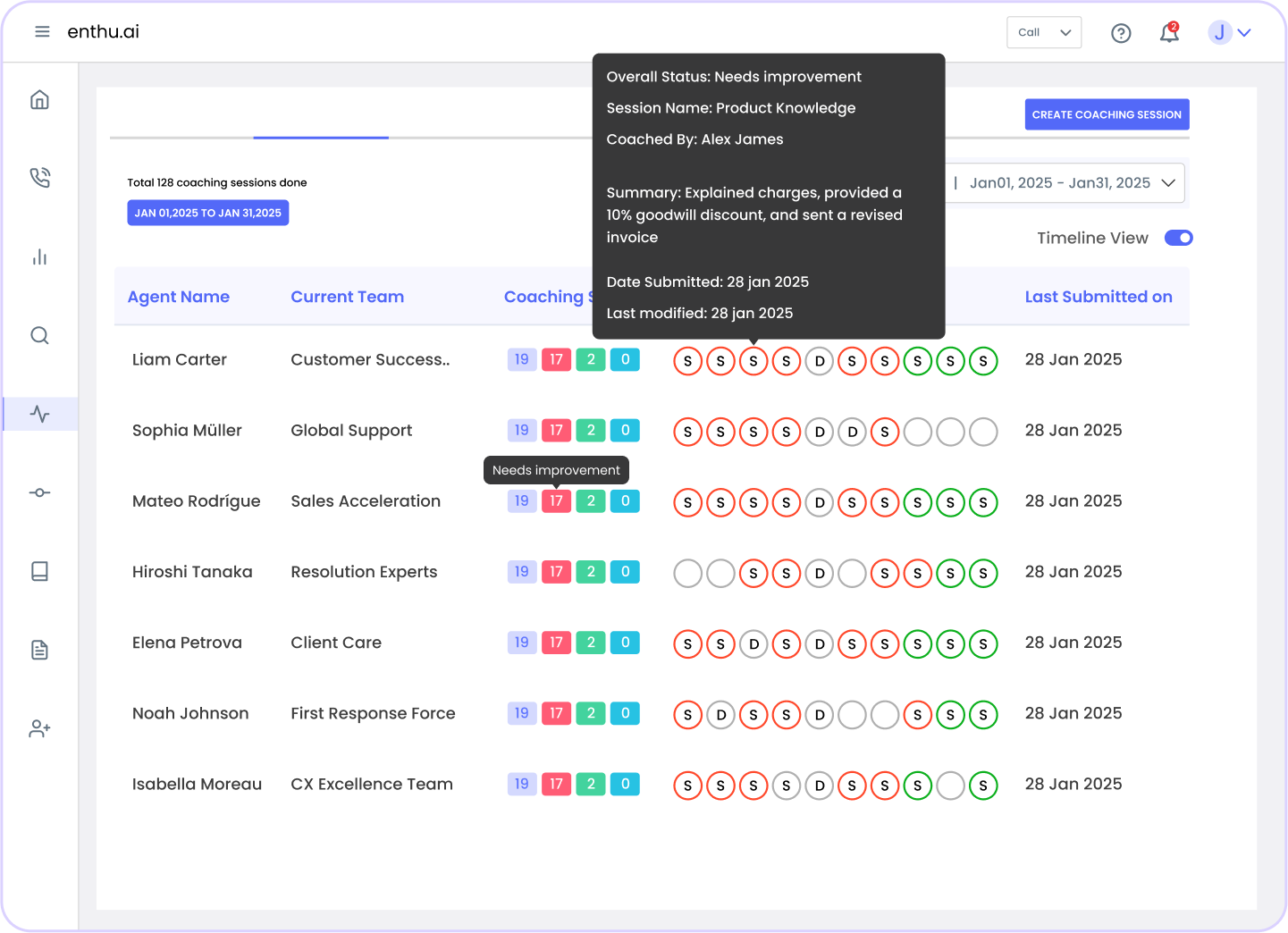
3. Drives consistency across the team
One of the biggest frustrations for agents is inconsistent feedback. They might get praised by one supervisor and penalized by another for the same behavior.
Scorecards solve that by creating a standard set of evaluation criteria. Everyone gets measured the same way (based on their role), which builds fairness and transparency into your QA process.
It also helps you scale. Whether you’re managing 5 agents or 500, a consistent scorecard keeps quality from slipping through the cracks.
4. Helps identify top and bottom performers
Scorecards make it easier to spot trends – both good and bad.
High performers stand out quickly, making it easier to reward or promote them.
Underperformers are easier to flag early, so you can coach before problems get worse.
Instead of waiting for quarterly reviews, you can use weekly scorecard data to course-correct in real time.
Pro tip: Over time, you can even use scorecard data to predict attrition, burnout, or coaching needs before they impact the team.
5. Keeps everyone aligned with business goals
Your business goals change. Sometimes it’s about improving CSAT. Other times, it’s about reducing handle time or increasing upsells.
Scorecards let you adjust priorities based on what matters most and your agents follow suit.
You can weigh metrics like FCR or compliance more heavily depending on your current focus.
This ensures every call, every shift, and every coaching session ties back to the bigger picture.
In short, agent scorecards give you control, clarity, and consistency — three things every call center manager needs to succeed.
E. 7 Best practices for agent scorecards
A well-designed scorecard is like a GPS for agent performance. But like any tool, it only works if you use it right.
Here are 7 best practices that help you build better scorecards and actually drive results from them.
1. Use AI tools to automatically fill scorecards
Manually reviewing calls and filling out scorecards is time-consuming and often inconsistent. That’s where AI-powered QA tools come in.
These tools automatically evaluate 100% of calls, flag issues, and even score agents on predefined metrics like:
- Script adherence
- Tone and empathy
- Call resolution
- Compliance triggers (e.g., disclosures, disclaimers)
With Enthu.AI our customer auto-scores 100% of their customer conversations. It helped them spot more coaching opportunities and reduce manual errors.
Why it works:
- Saves hours of manual QA time
- Provides real-time feedback to agents
- Ensures consistent, bias-free scoring
- Scales easily as your team grows
Pro tip: Use AI to handle the scoring, but let humans handle coaching. The best results come when AI and team leads work together to guide performance.
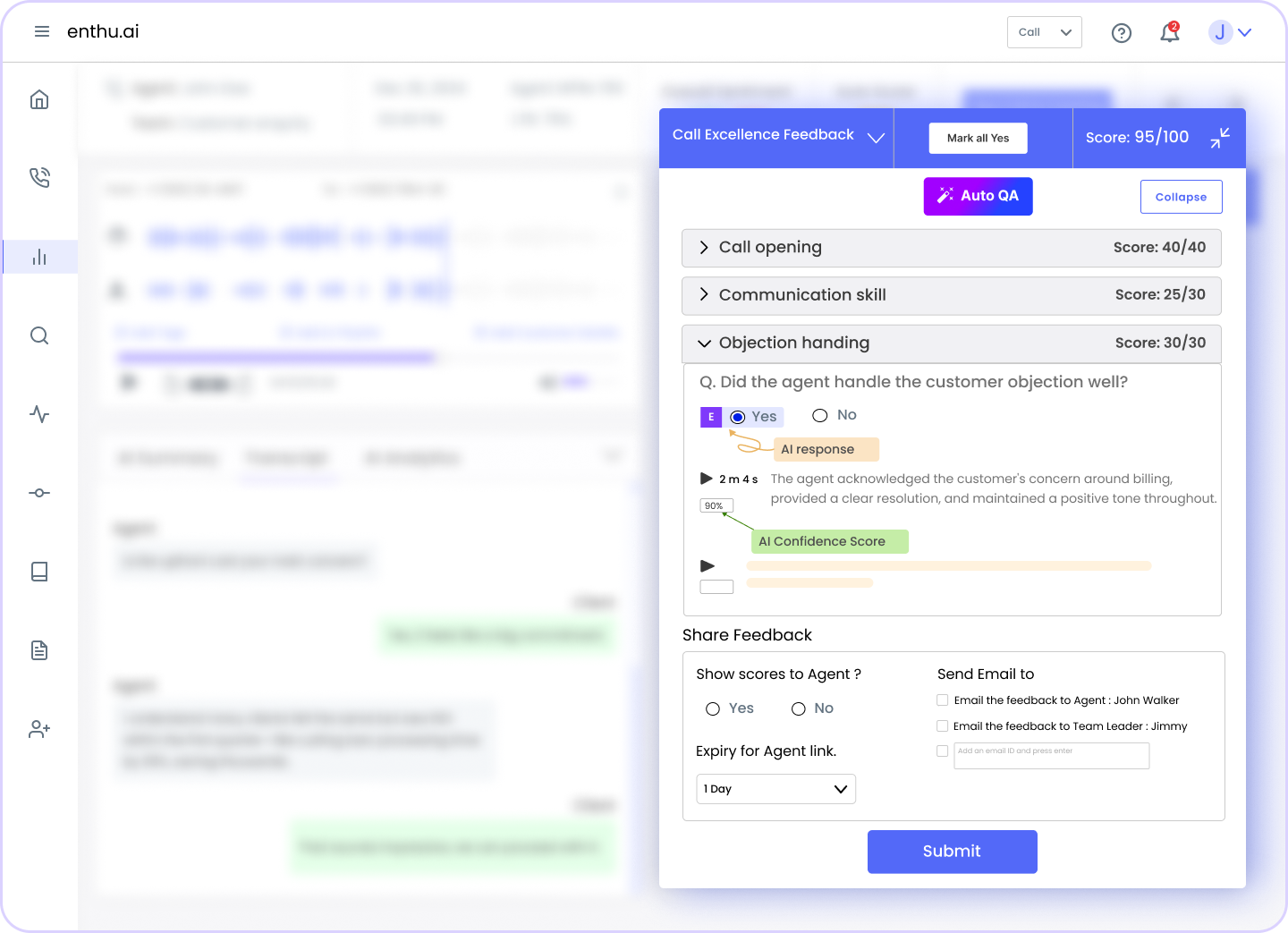
2. Start with your business goals
Don’t chase metrics just because everyone else is tracking them. Your scorecard should reflect what matters most to your contact center right now.
Example:
If you’re in collections, your top KPIs might be right-party contact rate, payment commitments, and compliance adherence.
But in a customer support center, you’d care more about FCR, CSAT, and average resolution time.
Pro tip: Before building your scorecard, ask:
“If we improved this metric, would it move the needle for our business?”
If the answer is no, leave it off.
3. Keep it simple – 5 to 7 metrics max
Trying to track too many things leads to confusion for you and your agents.
Focus on 5 to 7 high-impact metrics that reflect performance, behavior, and customer outcomes. Anything more than that and your scorecard becomes noise.
Why it works:
When agents can clearly remember what they’re being measured on, they’re more likely to focus on those areas during calls.
Example:
Instead of 12 metrics, try this simplified set:
- CSAT
- QA score
- AHT
- FCR
- Adherence
- Compliance
It’s enough to give you a complete picture, without overwhelming your team.
4. Customize scorecards by role
Not every agent has the same job, so don’t use the same scorecard across the board.
Example:
A sales agent shouldn’t be penalized for high AHT if they’re closing deals.
A Tier 2 support agent might spend 30 minutes troubleshooting – and that’s a win, not a miss.
Customize scorecards based on:
- Inbound vs. outbound
- Support vs. sales
- Junior vs. senior agents
- Specialized roles (tech support, fraud, etc.)
5. Share scores regularly, not just during reviews
Waiting for quarterly reviews is too late. Scorecards work best when they’re used frequently and proactively.
Best practice: Share scorecard results weekly or bi-weekly. Use them in:
- 1:1 coaching sessions
- Team huddles
- Performance snapshots in dashboards
Every time QA fills out a scorecard, Enthu.AI users can easily share it with agents.
6. Tie scores to coaching, not just discipline
A scorecard shouldn’t feel like a “gotcha.” It should be the start of a conversation.
Use low scores as a springboard for coaching, not punishment.
Example:
If an agent’s FCR is dipping, pull 2–3 calls where the customer had to call back.
Review them together. Ask the agent what they could have done differently. Use it as a teachable moment, not a lecture.
When agents see the scorecard as a tool for growth, not fear, they’re more likely to engage, ask questions, and take initiative.
7. Involve agents in the process
Agents are more likely to enjoy the scorecard when they help shape it.
How to do it:
Hold a feedback session when rolling out a new scorecard.
Ask team leads and top performers: “What do you think is fair?”
Let agents ask questions about how metrics are defined and scored.
One of our customers in the call center industry invited agents to co-create their empathy rubric. The result? Better agent buy-in, fewer QA disputes, and more consistent call quality.
When agents feel ownership, they’re more motivated to hit the target.
In short:
A scorecard is only as good as how you use it. Keep it focused, fair, and flexible and it’ll do more than track performance. It’ll drive it.
F. 4 Common mistakes to avoid with agent scorecards
Even the best-intentioned scorecard can backfire if not implemented with care.
These aren’t just setup errors – they’re the kind of issues that erode agent trust, mess with morale, and give you misleading data.
Here are 4 mistakes that can quietly sabotage your QA efforts:
1. Making the scorecard feel like a surveillance tool
If agents feel like they’re being constantly watched or micromanaged, they’ll disengage.
What happens:
Agents stop taking risks, talk like robots, and avoid escalations just to protect their score, even if it’s bad for the customer.
Why it’s a problem:
You might get better numbers, but worse outcomes. Customer experience takes a hit, and agent creativity disappears.
What to do instead:
Position the scorecard as a support and coaching tool, not a monitoring device. Make it clear it’s there to help them win, not trip them up.
2. Ignoring context behind the numbers
A scorecard only tells you what happened, not why.
What happens:
An agent gets marked down for high handle time, but no one notices they were handling a tricky billing dispute. Or a drop in FCR is actually due to a broken internal tool, not poor agent performance.
Why it’s a problem:
You end up coaching the wrong thing, or worse, demotivating a good agent.
What to do instead:
Always pair scorecard results with call context and QA notes. Use the scorecard as a conversation starter, not the final word.
3. Relying too heavily on manual QA
Manual scoring is time-consuming, and even with rubrics, bias creeps in.
What happens:
Supervisors unconsciously favor certain agents, or agents with low visibility get skipped during audits. Only 2–5% of calls get reviewed, leaving blind spots everywhere.
Why it’s a problem:
The scorecard ends up reflecting luck or favoritism, not performance. Good agents go unnoticed, and bad habits slip through.
What to do instead:
Use AI-driven QA tools to auto-score 100% of calls. Let your human reviewers focus on coaching, not spreadsheet work.
4. Never sharing scorecard results with agents
What’s the point of measuring performance if agents never see their scores?
What happens:
Agents get blindsided during performance reviews. They feel disconnected from goals. Coaching becomes reactive instead of proactive.
Why it’s a problem:
It kills trust. Agents tune out and think, “Why bother improving if no one tells me how I’m doing?”
What to do instead:
Make scorecards visible. Use dashboards or weekly check-ins so agents can track progress over time. Transparency = accountability.
Conclusion
A scorecard is more than a performance tracker – it’s a tool for growth.
Used right, it builds trust, sharpens coaching, and helps your agents do their best work.
It’s not just about the numbers. It’s about using those numbers to create better conversations, better habits, and a better team.
Keep it fair. Keep it focused. And above all, keep it human.
FAQs
1. What is the objective of an agent scorecard?
An agent scorecard evaluates the performance of customer service agents based on specific metrics to determine their efficiency, response time, customer satisfaction, and quality of work.
2. How do you create an agent scorecard?
Creating an agent scorecard involves: a) setting targets and KPIs b) collecting data through tools and systems c) regularly assessing and analysing results d) Providing feedback and coaching e) Continuously refining scorecard.
3. What are the types of agent scorecards ?
Types of agent scorecards include: qualitative metrics (customer satisfaction, tone of voice), quantitative metrics (response time, call handling time), and blended metrics (combination of qualitative and quantitative data).
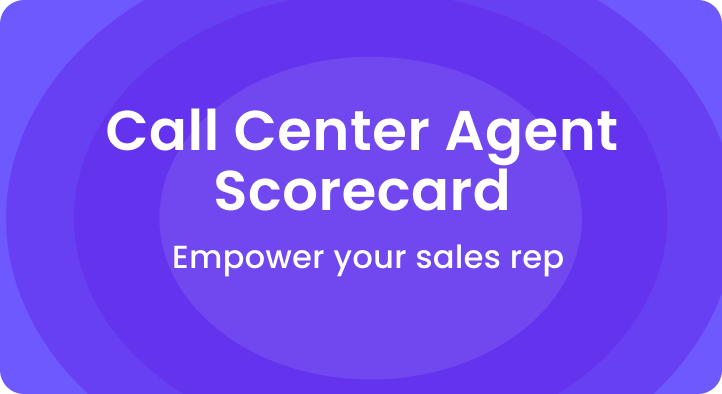


 On this page
On this page